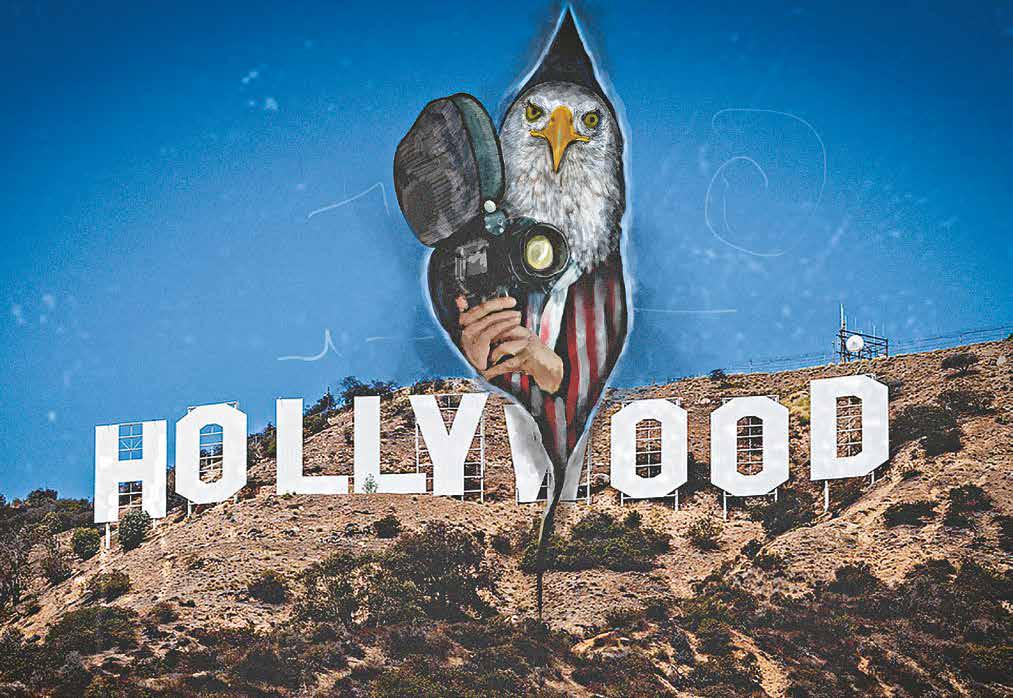Versuchen GOLD - Frei
American Patriot
Outlook
|January 21, 2025
Barring a few exceptions, Hollywood movies continue to be gung-ho about the United States' penchant for waging wars across the globe

THE battle is raging, the 'evil' forces are about to pull off a win. The soundtrack crescendos. Bloodied and battered, the losing side looks death in the eye. It's now or never, mates. And then comes the miracle: Americans dressed in military uniform, guns blazing, gimlet-eyed, all pumped up to save the day. Think Act of Valor (dir. Mouse McCoy 2012), think The Outpost (dir. Rod Lurie, 2019). Hollywood has a tried and tested template for onscreen portrayal of the American military. It's a pretty simple one: no moral conundrums to confuse moviegoers. No references to America's war machine or its eternal empire-building enterprise. Hollywood dutifully sticks to the template: American forces good, the other side bad.
American forces save lives. American forces fight just battles. To keep America safe. To keep the world from falling into the hands of the barbarians at the gates.
Hollywood's glorification of American forces has a long history. When World War II broke out and the United States entered the fight, Hollywood was asked to march in step. Soldiers were given clear instructions (win the war) and so was the American movie industry (help your country win the war). The US Office of War Information had a dedicated unit-the Bureau of Motion Pictures-to keep watch on Hollywood. Between 1942-45, the Bureau was hard at work; reviewing 1,652 scripts, deleting or revising any material that showed America in a less than favourable light. Scripts that were not enthusiastic about valourising the US troops or portraying the evil nature of the enemy didn't make the cut. Elmer Davis, the head of the Office of War Information, famously said, "The easiest way to inject a propaganda idea into most people's minds is to let it go through the medium of an entertainment picture when they do not realize they are being propagandized." Davis was specifically referring to World War II at the time, but his words still ring loud and clear in Hollywood's ears.
Diese Geschichte stammt aus der January 21, 2025-Ausgabe von Outlook.
Abonnieren Sie Magzter GOLD, um auf Tausende kuratierter Premium-Geschichten und über 9.000 Zeitschriften und Zeitungen zuzugreifen.
Sie sind bereits Abonnent? Anmelden
WEITERE GESCHICHTEN VON Outlook

Outlook
The Spectacle of the Woman Accused
Media narratives—especially when women are involved—can end up amplifying suspicion and weaponising gender
7 mins
March 11, 2026

Outlook
The Stink of Epstein
Why are the rich and powerful of the world scared of what lies buried in the Jeffrey Epstein files?
6 mins
March 11, 2026

Outlook
Passing the Watermelon
Narendra Modi's presence in Israel is being read not just as a bilateral engagement, but as an endorsement of Israeli action in Gaza and the West Bank
5 mins
March 11, 2026

Outlook
For Phoolan, Who Wasn't a Devi
“Whether or not it is the Truth is no longer relevant. The point is that it will, (if it hasn’t already) - become the Truth. Phoolan Devi, the woman has ceased to be important. (Yes of course she exists. She has eyes, ears, limbs, hair etc. Even an address now) But she is suffering from a case of Legenditis. She’s only a version of herself. There are other versions of her that are jostling for attention. Particularly Shekhar Kapur’s “Truthful” one, which we are currently being bludgeoned into believing.”–Arundhati Roy in ‘The Great Indian Rape-Trick I’, on the film Bandit Queen by Shekhar Kapur based on Phoolan, whom he never met because he didn’t think he needed to meet her. The film was based on journalist Mala Sen’s book India’s Bandit Queen: The True Story of Phoolan Devi.
5 mins
March 11, 2026

Outlook
The Chic Cartel
Women are not just victims or side characters in recent crime-and-power OTT dramas. They are complex forces-capable of empathy, strategy and ruthlessness-whose narratives demand both recognition and reckoning
5 mins
March 11, 2026

Outlook
The Hierarchy of Sympathy
In crimes against women, justice is shaped not only in courtrooms but in newsrooms where narrative determines whose suffering becomes national conscience and whose fades into procedural silence
5 mins
March 11, 2026

Outlook
Dasyu Sundari
Media accounts simultaneously cast her as victim and avenger, until a life shaped by caste violence and gendered oppression was repackaged into a consumable myth of dishonour and revenge
8 mins
March 11, 2026

Outlook
Prince Pervert
Are rumours of the death of the rule of law vastly exaggerated?
4 mins
March 11, 2026
Outlook
Together, Apart
Poonam Saxena's translations of Mannu Bhandari and Rajendra Yadav's memoirs present a portrait of the trailblazing Hindi writer-couple's marriage and of newly independent India
3 mins
March 11, 2026

Outlook
The Great Indian Rape Trick'
The trope of transforming sexual violence against women into a springboard for rage that can only be channelled through counter-violence has long served as a popular framework in cinema, both globally and in India
6 mins
March 11, 2026
Listen
Translate
Change font size
